The Best 10 Alternatives to Krontech Single Connect (+ Pricing & Reviews)
Twingate Team
•
Jul 27, 2024

Krontech Single Connect is a Privileged Access Management (PAM) solution designed to provide secure, centrally managed access control for enterprises and telecommunications companies. While it offers robust security features, it may not be suitable for every organization. This article explores the benefits and limitations of Krontech Single Connect.
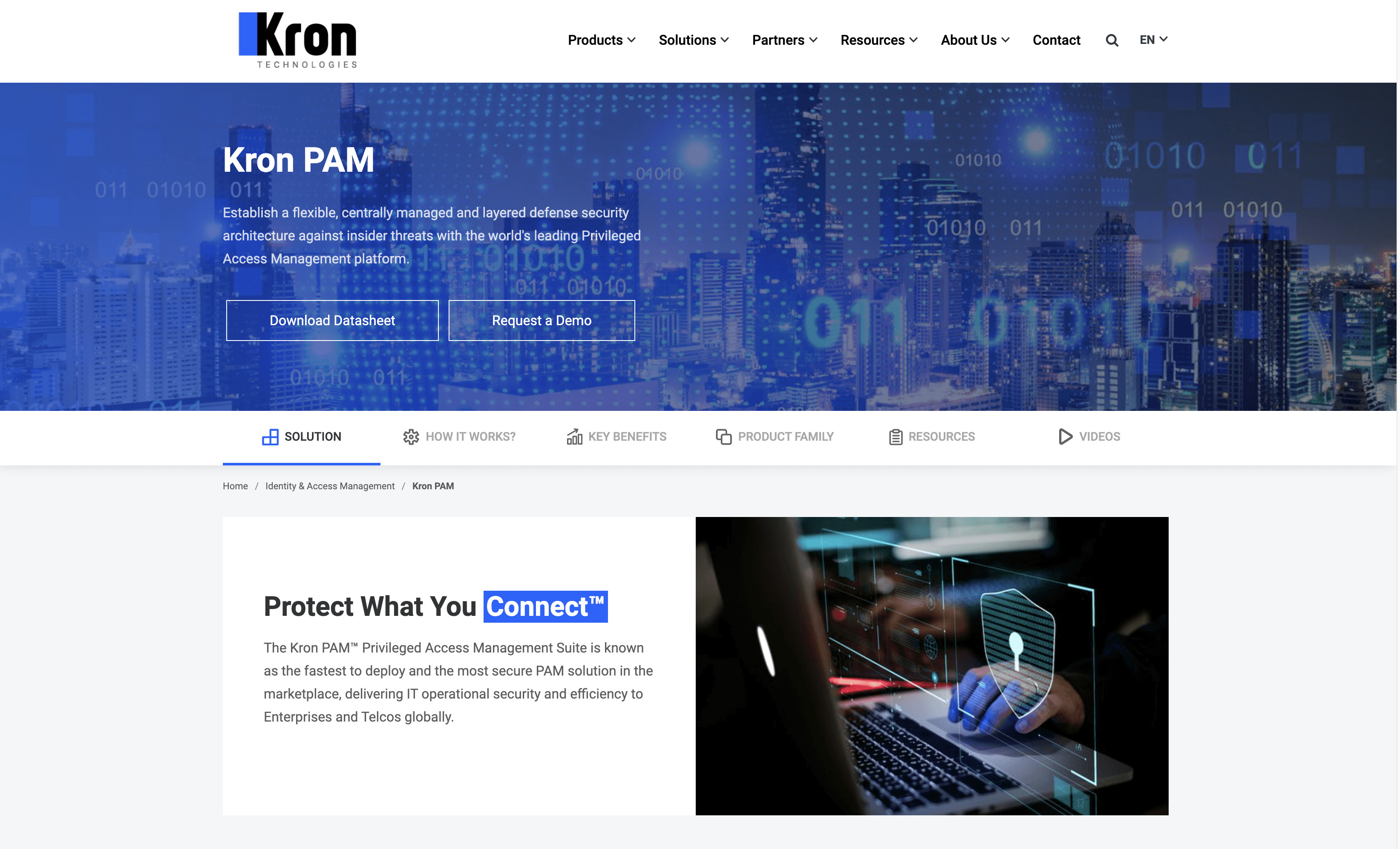
10 Alternatives to Krontech Single Connect
1. JumpCloud
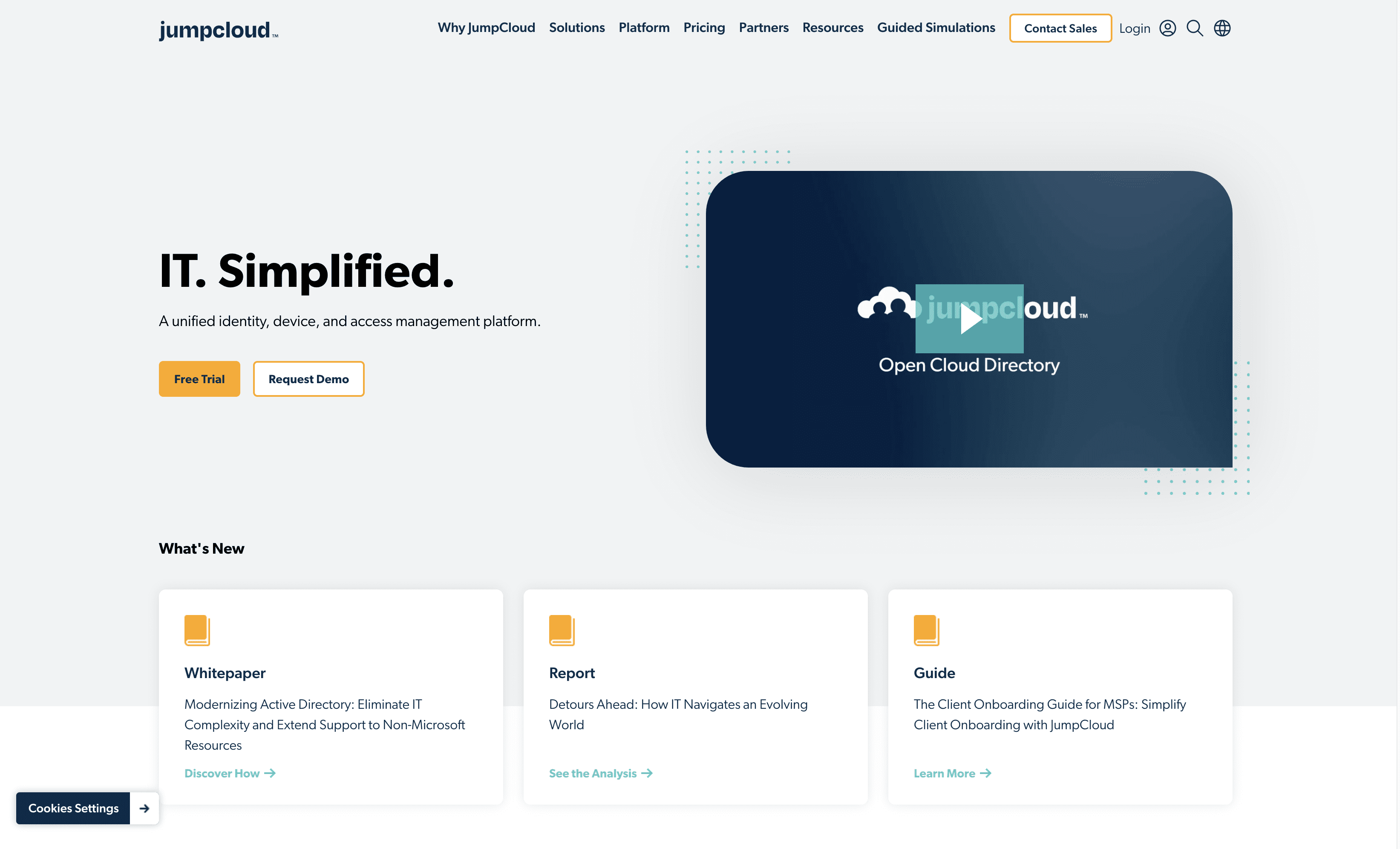
JumpCloud is a platform offering unified identity, device, and access management solutions. It simplifies IT management by providing a single interface for managing users and devices. With features like multi-factor authentication and single sign-on, JumpCloud aims to enhance security and streamline operations for businesses of all sizes.
JumpCloud Pricing
Device Management: $9/user/month billed annually or $11 billed monthly.
SSO: $11/user/month billed annually or $13 billed monthly.
Core Directory: $13/user/month billed annually or $15 billed monthly.
Platform: $19/user/month billed annually or $22 billed monthly.
Platform Prime: $24/user/month billed annually or $27 billed monthly.
JumpCloud Reviews
JumpCloud has an overall rating of 4.5 out of 5 stars based on 2,798 reviews. Users praise its ease of use and robust security features. Check out more of our reviews here!
Pros and Cons of JumpCloud
Pros:
Unified Platform: JumpCloud offers a single platform for managing identities, devices, and access, simplifying IT operations.
Secure Access: Provides secure, frictionless access to necessary resources, enhancing user productivity and security.
Positive Feedback: Customers like MiQ Digital and Classpass praise its effectiveness and cost savings.
Cons:
Complexity: The wide range of features can be overwhelming for new users or small businesses without dedicated IT staff.
Potential Cost: Comprehensive platforms like JumpCloud can be expensive, especially for smaller organizations.
Internet Dependence: As a cloud-based solution, it requires reliable internet connectivity, which might be a limitation in areas with poor infrastructure.
2. HashiCorp Vault
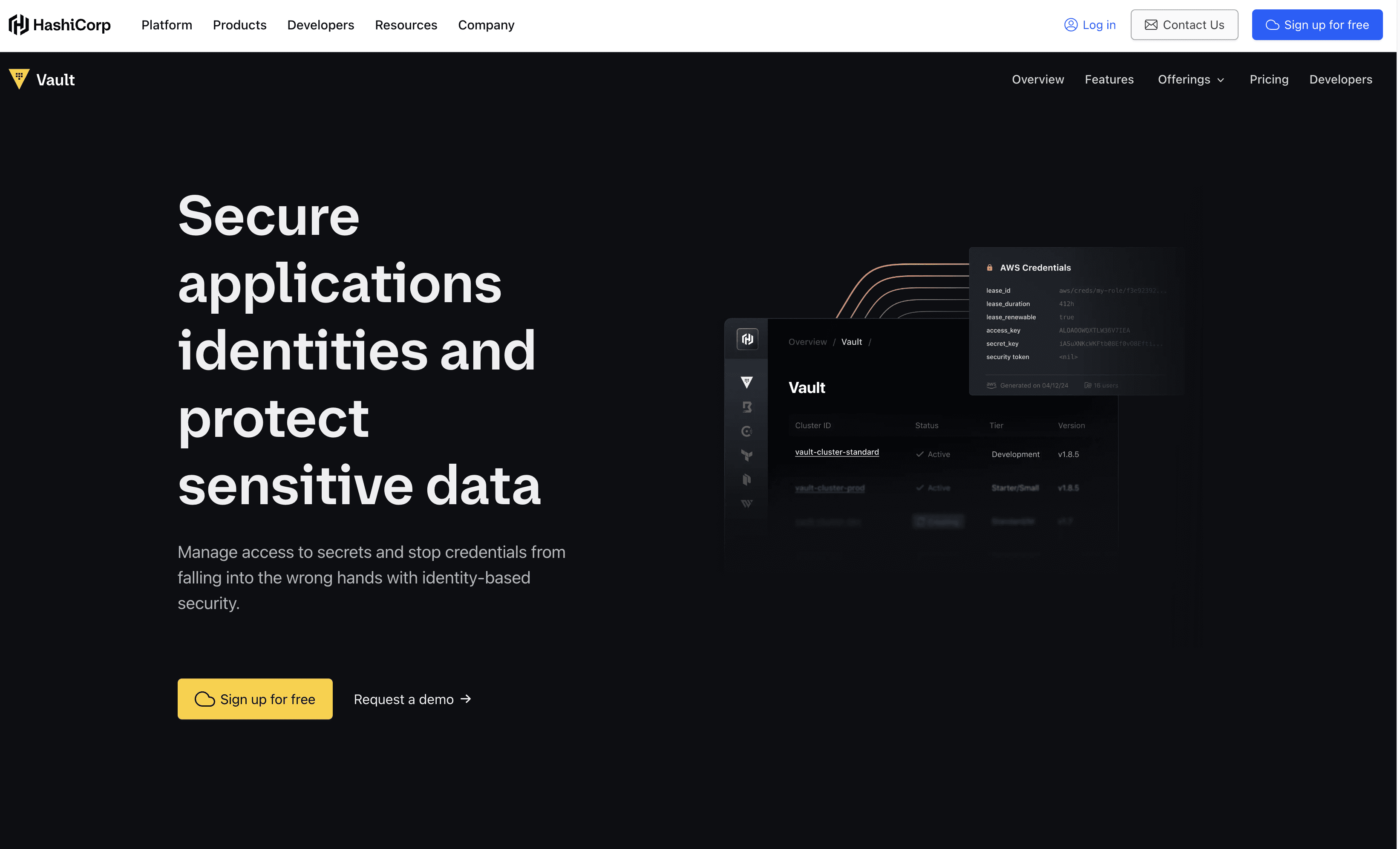
HashiCorp Vault is a security tool designed for identity-based secrets management. It helps manage and protect sensitive data by controlling access to secrets and automating their lifecycle. With features like secrets management, certificate management, and data protection, Vault aims to enhance security and simplify operations for businesses of all sizes.
HashiCorp Vault Pricing
HCP Vault Secrets: Free, Standard, Plus
HCP Vault Dedicated: Standard, Plus
Vault Enterprise: Custom
HashiCorp Vault Reviews
HashiCorp Vault has an overall rating of 4.8 out of 5 stars based on 4 reviews. Users praise its automation and support. Check out more of our reviews here!
Pros and Cons ofHashiCorp Vault
Pros:
Identity-based Security: Automatically authenticates and authorizes access to secrets and sensitive data, ensuring robust protection.
Centralized Secrets Management: Centrally stores, accesses, and distributes secrets programmatically, simplifying secret management.
Automated Certificate Management: Generates, rotates, and revokes certificates on demand, reducing manual intervention.
Cons:
Complexity: Implementing and managing an identity-based secrets management system may require a steep learning curve and expertise.
Integration Effort: Integrating Vault with existing systems and workflows might require significant effort and customization.
Cost: While the page mentions a free tier, the full-featured versions and enterprise support may come at a higher cost, which could be a consideration for smaller organizations.
3. Sailpoint
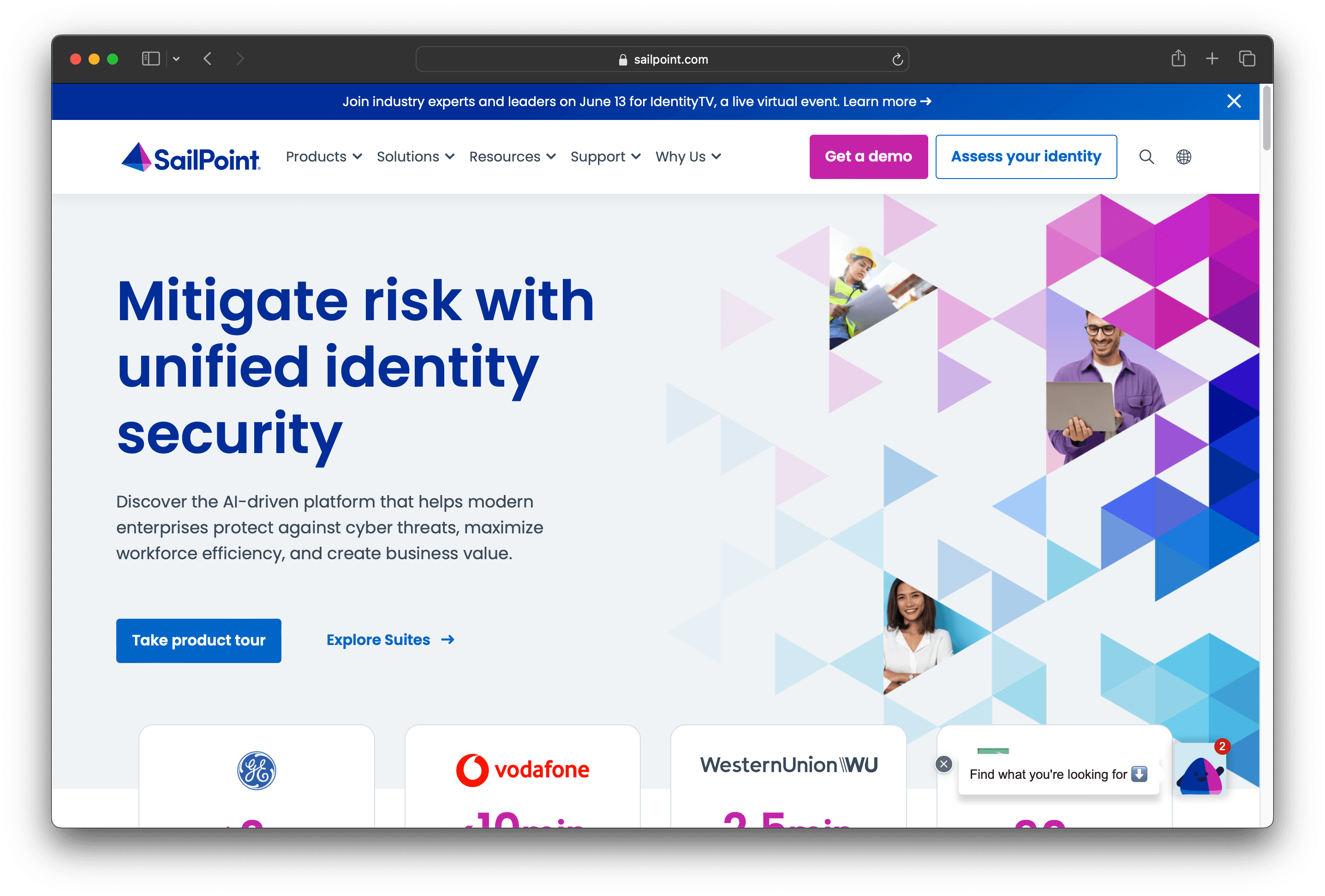
SailPoint is an identity security solution designed to help organizations manage and secure their digital identities. It offers a unified platform for identity governance, access management, and compliance, making it easier for businesses to protect sensitive information and ensure regulatory compliance.
Sailpoint Pricing
Standard
Business
Business Plus
SailPoint's pricing is not public. Contact their support for more info.
Sailpoint Reviews
SailPoint has an overall rating of 4.4 out of 5 stars based on 76 reviews. Users appreciate its robust identity management features but note some setup complexities. Check out more of our reviews here!
Pros and Cons of Sailpoint
Pros:
Intelligent Insights: Powered by machine learning and advanced AI, providing instant insights to understand identities and access at speed and scale.
Autonomous Identity Management: Streamlines identity processes and decisions, driving organization-wide efficiency.
Extensible Platform: Centralizes access control for all data, applications, systems, and cloud resources with seamless integration across the entire ecosystem.
Cons:
Complexity: The extensive range of products and capabilities might be overwhelming for new users or smaller organizations.
Implementation Time: Despite the benefits, the initial setup and implementation of such a comprehensive identity security platform could be time-consuming.
Cost: Advanced features and extensive capabilities might come at a higher cost, which could be a barrier for smaller enterprises.
4. ManageEngine PAM360
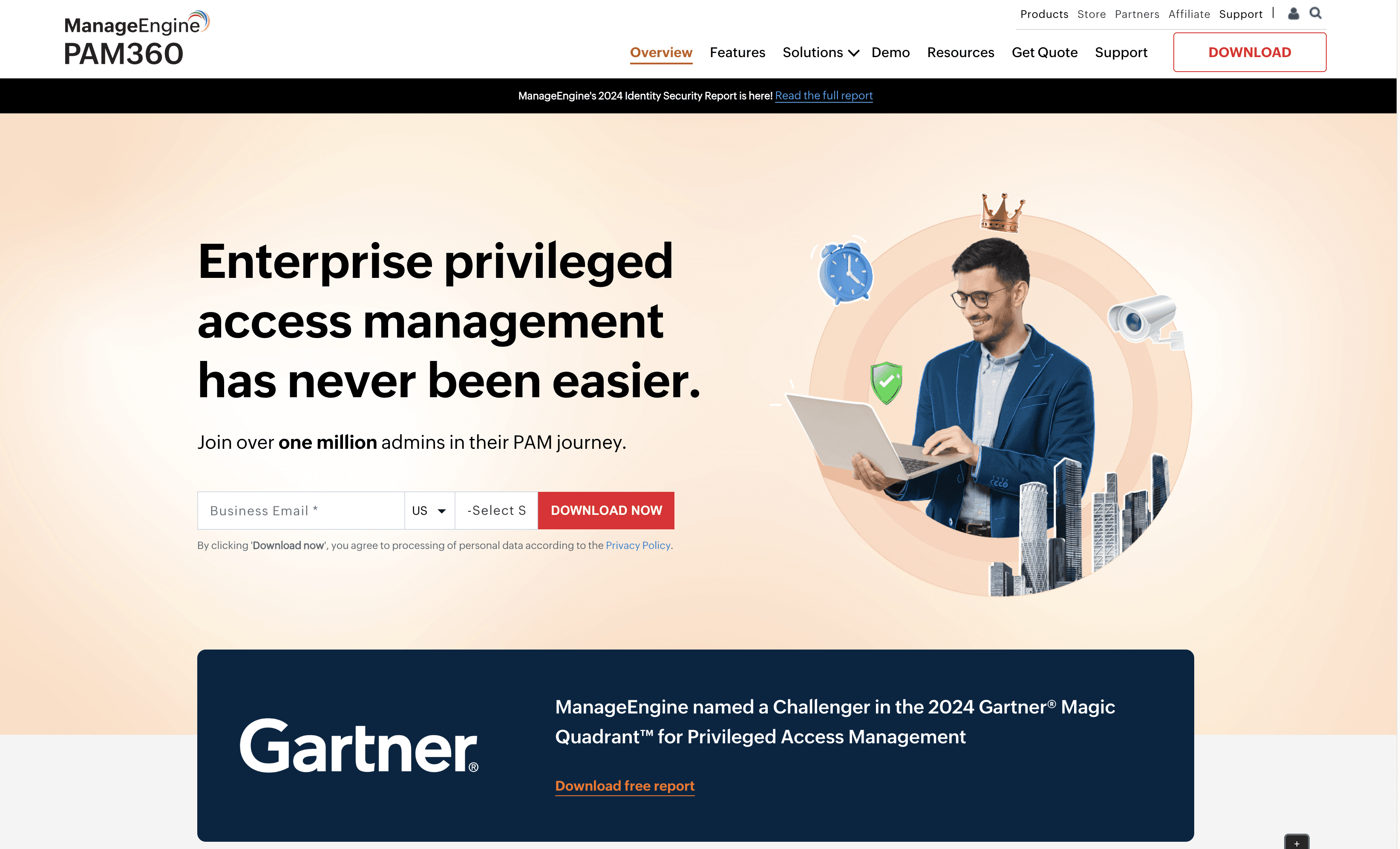
ManageEngine PAM360 is a comprehensive Privileged Access Management solution designed for modern enterprises. It offers features like privileged account management, session monitoring, and cloud infrastructure entitlements management. With its user-friendly interface and robust integration capabilities, PAM360 aims to enhance security and streamline access management for businesses.
ManageEngine PAM360 Pricing
ManageEngine PAM360's pricing is not public. Contact their support for more info.
ManageEngine PAM360 Reviews
ManageEngine PAM360 has an overall rating of 4.5 out of 5 stars based on 1 review. Users praise its ease of integration and user-friendly interface. Check out more of our reviews here!
Pros and Cons of ManageEngine PAM360
Pros:
Comprehensive Feature Set: Includes essential PAM controls like PASM, PEDM, cloud infrastructure entitlements management, and more.
Compliance Ready: Meets standards like NIST, PCI-DSS, HIPAA, and ISO-IEC 27001, ensuring regulatory compliance.
User-Friendly Interface: Known for its intuitive UI, making it easy to manage and deploy.
Cons:
Complexity for Small Businesses: Extensive features might be overwhelming for smaller organizations with simpler needs.
Potential Learning Curve: Comprehensive nature may require a learning period for new users to fully utilize all features.
Cost: Enterprise-level features and compliance readiness might come at a higher cost, which could be a consideration for budget-conscious organizations.
5. Cyberark
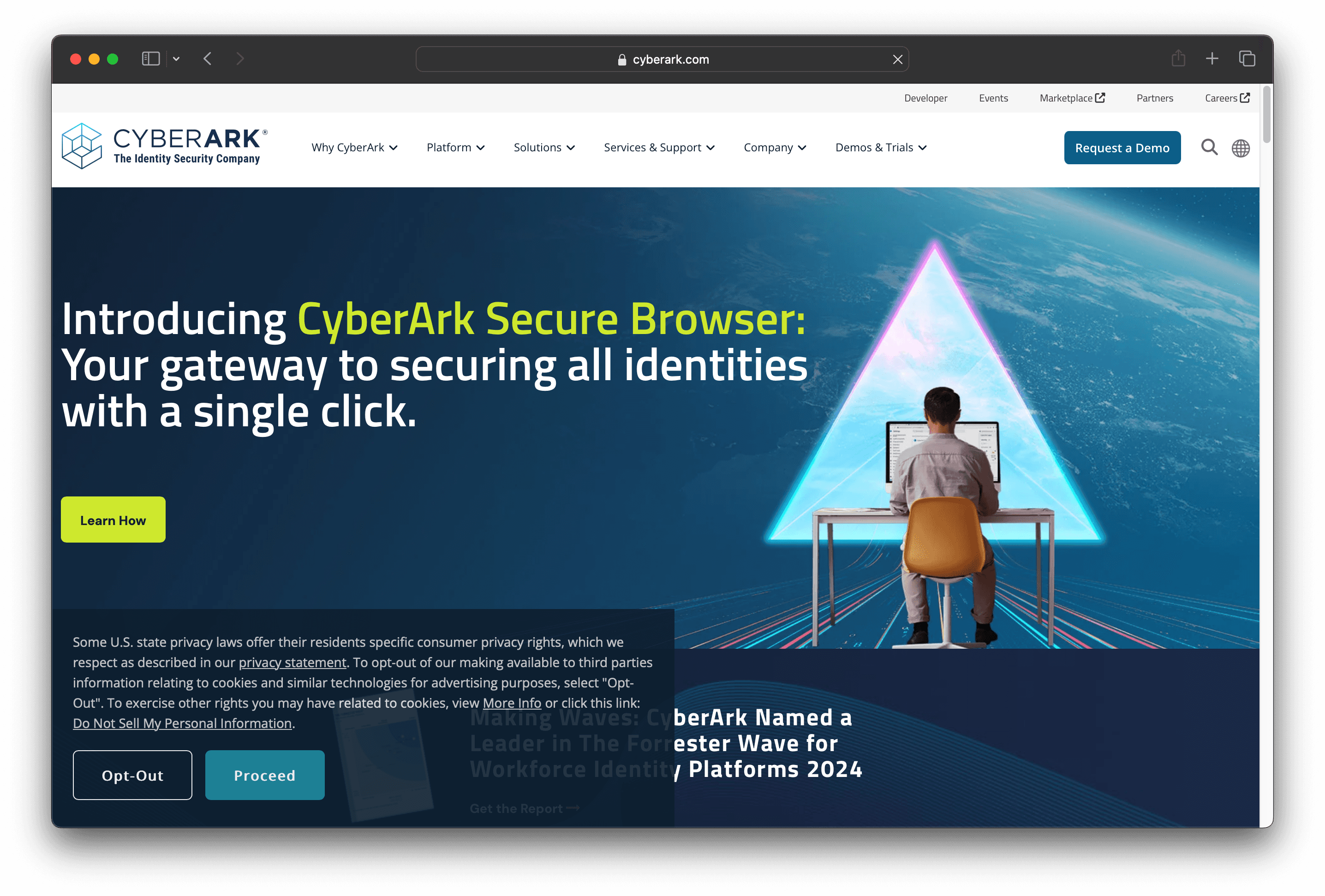
CyberArk is a security solution designed to protect identities and manage access across various environments. It offers a comprehensive platform that includes privileged access management, secrets management, and cloud security. CyberArk aims to enhance security and streamline operations for businesses of all sizes.
Cyberark Pricing
Cyberark's pricing is not public. Contact their support for more info.
Cyberark Reviews
Cyberark has an overall rating of 4.4 out of 5 stars based on 64 reviews. Users appreciate its security features and ease of use. Check out more of our reviews here!
Pros and Cons of Cyberark
Pros:
Comprehensive Security: CyberArk offers extensive security solutions, covering privileged access, secrets management, and endpoint privilege security.
Intelligent Privilege Controls: The platform ensures secure access for both human and machine identities across the entire IT estate.
Flexible Automation: Streamlines HR processes, ensures compliance, and improves efficiencies through automation and orchestration.
Cons:
Complexity: The comprehensive nature of CyberArk's solutions may introduce complexity in deployment and management.
Cost: Implementing a full suite of CyberArk's security solutions could be expensive for smaller organizations.
Integration Challenges: Integrating with existing systems and processes may still pose challenges and require significant effort.
6. Arcon PAM
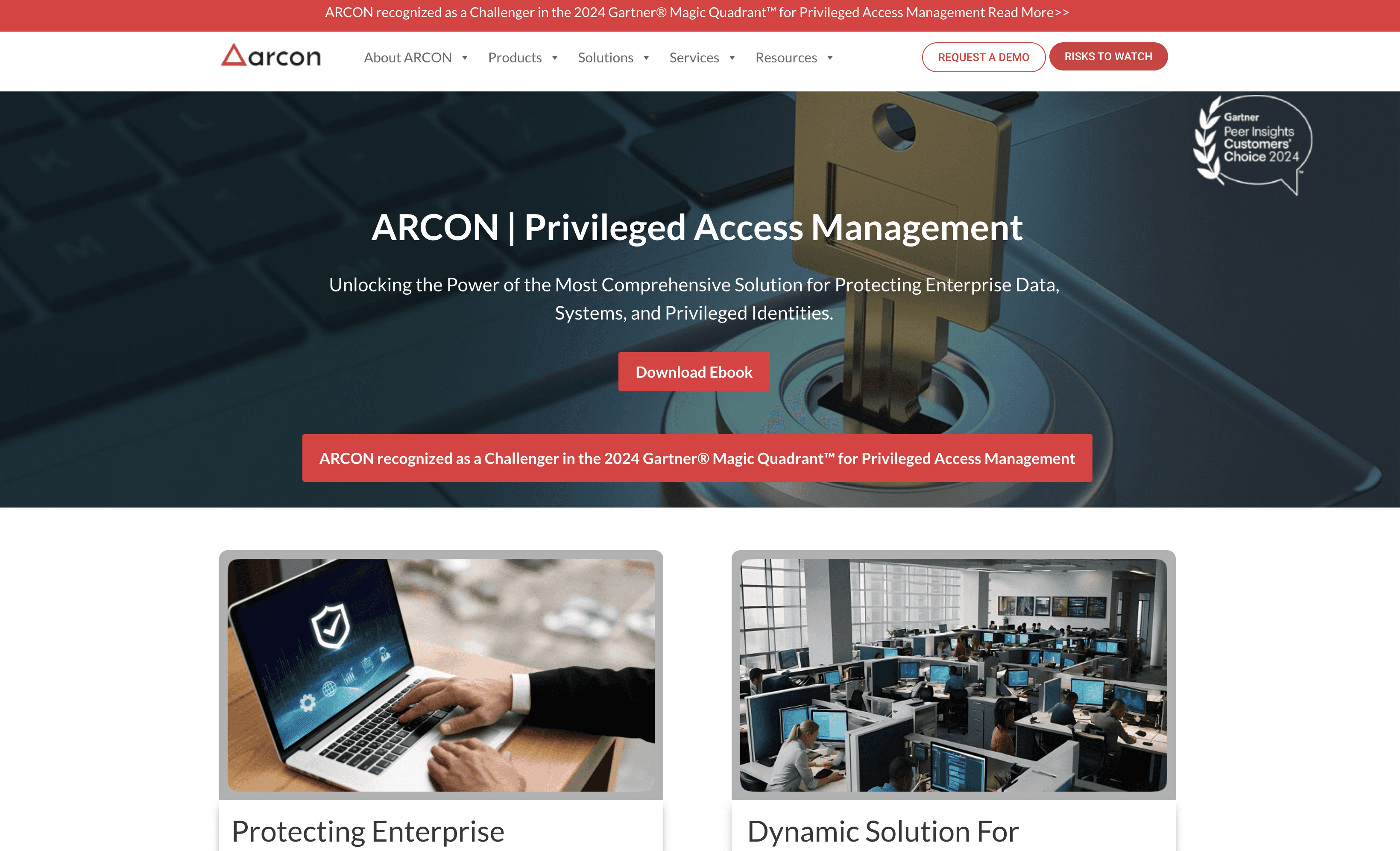
Arcon PAM is a security solution designed to protect enterprise data and manage privileged identities. It offers features like multifactor authentication, session management, and credential protection. Arcon PAM aims to secure privileged access across complex IT environments, ensuring robust protection against insider and third-party threats.
Arcon PAM Pricing
Arcon PAM's pricing is not public. Contact their support for more info.
Arcon PAM Reviews
Arcon PAM has an overall rating of 4.3 out of 5 stars based on 23 reviews. Users appreciate its security features and user-friendly interface. Check out more of our reviews here!
Pros and Cons of Arcon PAM
Pros:
Smooth onboarding process ensures quick and efficient integration, minimizing downtime and enhancing productivity.
Easy-to-use web console simplifies management tasks, making it accessible even for non-technical users.
Advanced features like credential vault and real-time threat analytics provide robust security and monitoring capabilities.
Cons:
Complex implementation and deployment may require significant time and expertise, posing challenges for smaller teams.
Dependency on the database can introduce vulnerabilities and necessitate additional security measures.
Limited customization options might not meet the specific needs of all organizations, reducing flexibility.
7. Foxpass
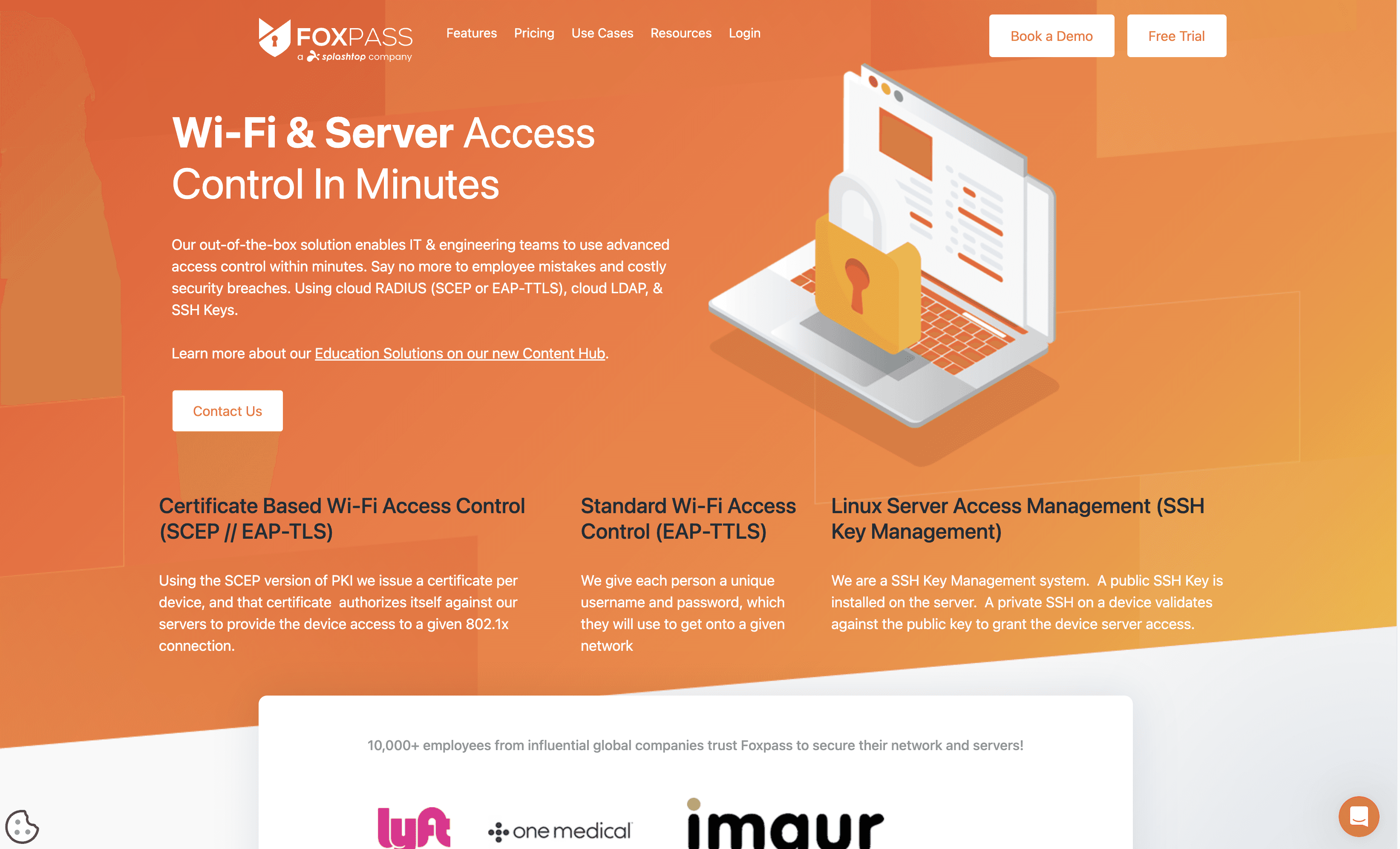
Foxpass is a cloud-based service offering RADIUS and LDAP server authentication solutions. It provides advanced access control for Wi-Fi and servers, ensuring secure and reliable authentication. With features like SSH key management and certificate-based access, Foxpass aims to simplify and enhance security for businesses of all sizes.
Foxpass Pricing
Free tier for up to 10 standard users.
Standard Users: Contact support for pricing.
Posix Users: Contact support for pricing.
Engineer Users: Contact support for pricing.
Foxpass Reviews
Foxpass has an overall rating of 4.8 out of 5 stars based on 34 reviews. Users appreciate its ease of use and excellent support. Check out more of our reviews here!
Pros and Cons of Foxpass
Pros:
Excellent Technical Support: Users praise Foxpass for its exceptional support, including live video tech support and personal calls to resolve issues.
Ease of Use: Foxpass is appreciated for its simplicity and minimal effort required, especially compared to other solutions like Active Directory.
Integration Capabilities: Integrates seamlessly with systems like G Suite, Okta, and AWS, making it versatile for various IT environments.
Cons:
User Interface and Experience: Some users find the UI/UX clunky and unpolished, indicating room for improvement in design and user flow.
Initial Setup Challenges: Setting up LDAP binders can be fidgety, with an initial learning curve that could be improved.
Log Management: Users desire better log filters and audit logging capabilities, noting current limitations in these areas.
8. WALLIX Bastion
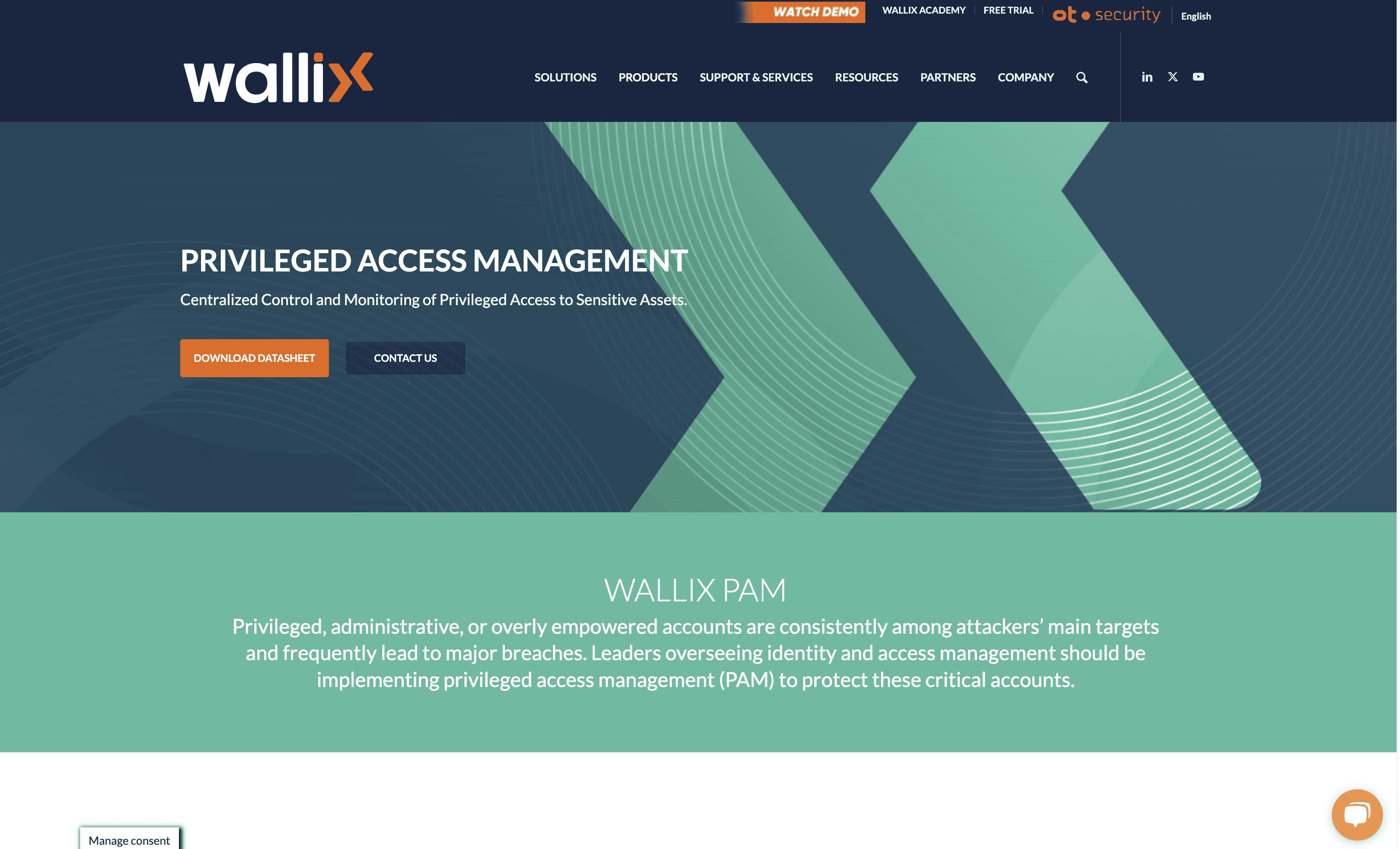
WALLIX Bastion is a security solution designed to manage and protect privileged accounts. It offers features like password management, session monitoring, and remote access control. With a focus on ease of use and robust security, WALLIX Bastion aims to safeguard critical IT infrastructure from unauthorized access and breaches.
WALLIX Bastion Pricing
WALLIX Bastion's pricing is not public. Contact their support for more info.
WALLIX Bastion Reviews
WALLIX Bastion has an overall rating of 4.5 out of 5 stars based on 8 reviews. Users appreciate its robust security features and ease of use. Check out more of our reviews here!
Pros and Cons of WALLIX Bastion
Pros:
Centralized Control: Integrates password and session management, enabling comprehensive auditing of all privileged credential activities.
Session Manager: Authenticates users and provides a detailed audit trail, including video, transcript, and metadata.
Password Manager: Manages password complexity and rotation, preventing unauthorized sharing or theft.
Cons:
Complex Implementation: Deploying and integrating the solution into existing infrastructure can be challenging.
Resource Intensive: Requires dedicated resources and expertise for management and maintenance.
High Cost: Total cost of ownership, including licensing and ongoing management, might be high for some businesses.
9. StrongDM
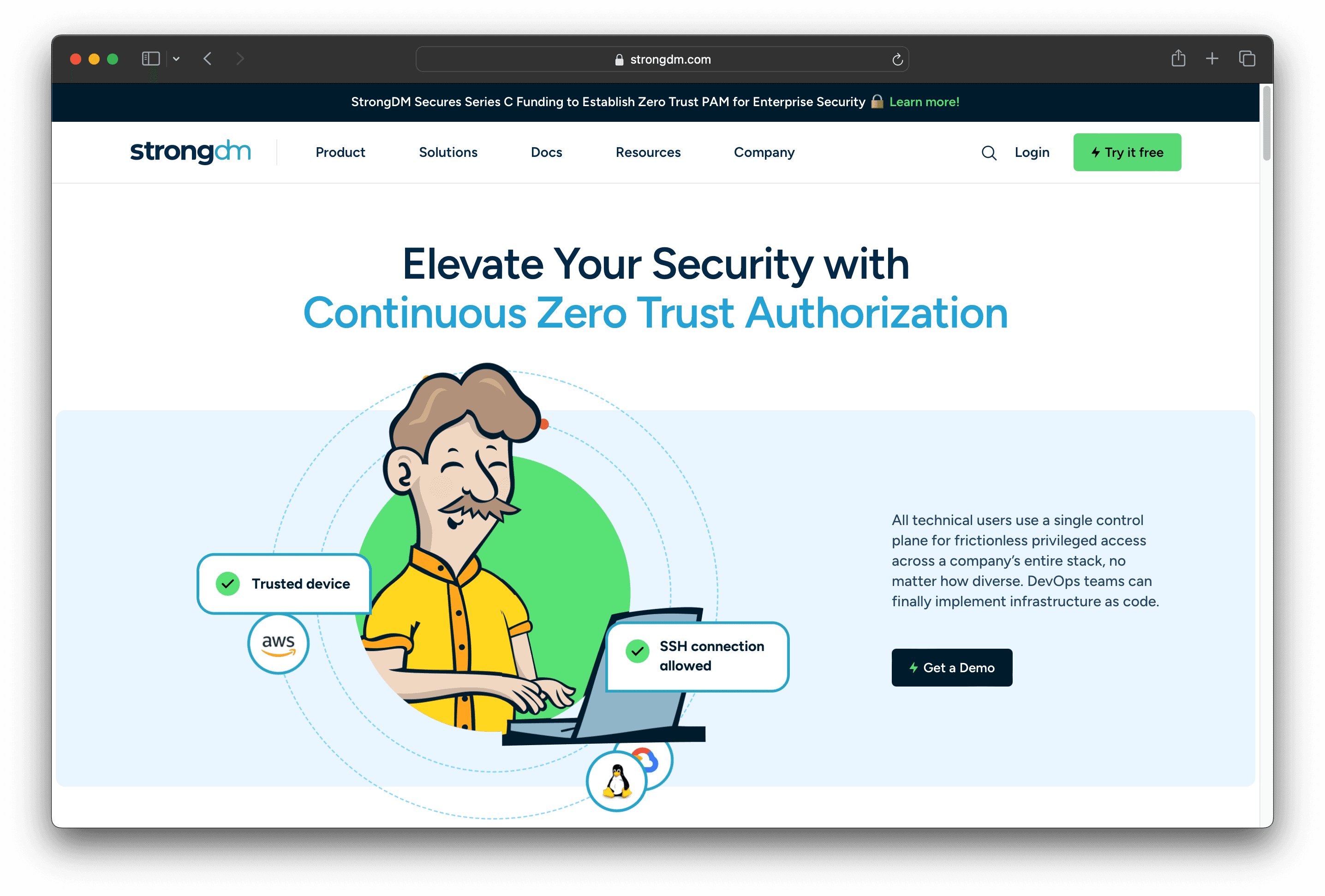
StrongDM is a security solution designed to manage and protect privileged access across your entire tech stack. It offers a zero-trust model, ensuring secure and seamless access for users. With features like just-in-time access and complete visibility, StrongDM aims to simplify and enhance security for businesses of all sizes.
StrongDM Pricing
StrongDM's pricing is not public. Contact their support for more info.
StrongDM Reviews
StrongDM has an overall rating of 4.7 out of 5 stars based on 81 reviews. Users appreciate its excellent customer support and ease of use. Check out more of our reviews here!
Pros and Cons of StrongDM
Pros:
Ease of Use: Users find StrongDM intuitive and straightforward, reducing the learning curve for new users.
Customer Support: Exceptional support, including live video assistance and personal calls, ensures quick issue resolution.
Access Control: Provides robust, policy-based control over privileged actions, enhancing security and compliance.
Cons:
Audit Logging Issues: Some users report limitations in log filtering and audit logging capabilities, impacting detailed monitoring.
Poor User Interface: The user interface is sometimes described as clunky, indicating room for improvement in design and usability.
Expensive: The cost of StrongDM can be a barrier for smaller organizations, making it less accessible for budget-conscious users.
10. BeyondTrust
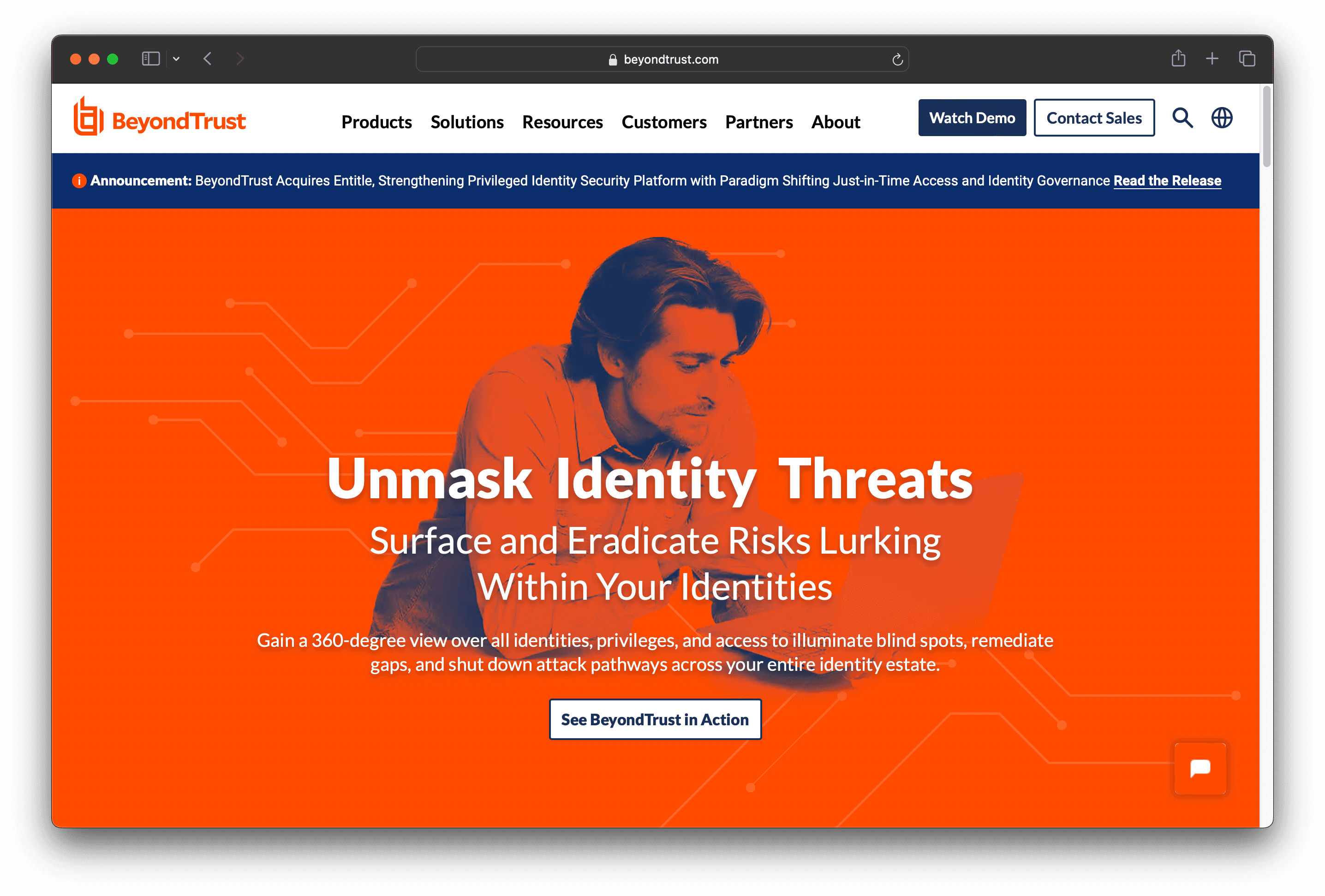
BeyondTrust is a security solution designed to manage and protect privileged access across various environments. It offers features like password management, session monitoring, and remote access control. With a focus on ease of use and robust security, BeyondTrust aims to safeguard critical IT infrastructure from unauthorized access and breaches.
BeyondTrust Pricing
BeyondTrust's pricing is not public. Contact their support for more info.
BeyondTrust Reviews
BeyondTrust has an overall rating of 4.7 out of 5 stars based on 340 reviews. Users appreciate its comprehensive security features and excellent customer support. Check out more of our reviews here!
Pros and Cons of BeyondTrust
Pros:
Remote Access: Provides secure and reliable remote access, ensuring seamless support and management of IT infrastructure.
Ease of Use: Intuitive interface simplifies navigation and operation, making it accessible for users of all technical levels.
Security Focus: Emphasizes robust security measures, protecting sensitive data and preventing unauthorized access.
Cons:
Expensive: High costs associated with advanced features and comprehensive security solutions may be prohibitive for smaller organizations.
Complexity: Implementation and management can be complex, requiring significant time and expertise.
Connectivity Issues: Users report occasional connectivity problems, impacting the reliability of remote support sessions.
Looking to secure your technical infrastructure?
Twingate offers granular access controls and deployment automations to protect your VPC environment. By leveraging Zero Trust security tools, Twingate ensures that private resources and internet traffic remain secure in the modern world of work. Try Twingate for Free today!
Rapidly implement a modern Zero Trust network that is more secure and maintainable than VPNs.
The Best 10 Alternatives to Krontech Single Connect (+ Pricing & Reviews)
Twingate Team
•
Jul 27, 2024

Krontech Single Connect is a Privileged Access Management (PAM) solution designed to provide secure, centrally managed access control for enterprises and telecommunications companies. While it offers robust security features, it may not be suitable for every organization. This article explores the benefits and limitations of Krontech Single Connect.

10 Alternatives to Krontech Single Connect
1. JumpCloud

JumpCloud is a platform offering unified identity, device, and access management solutions. It simplifies IT management by providing a single interface for managing users and devices. With features like multi-factor authentication and single sign-on, JumpCloud aims to enhance security and streamline operations for businesses of all sizes.
JumpCloud Pricing
Device Management: $9/user/month billed annually or $11 billed monthly.
SSO: $11/user/month billed annually or $13 billed monthly.
Core Directory: $13/user/month billed annually or $15 billed monthly.
Platform: $19/user/month billed annually or $22 billed monthly.
Platform Prime: $24/user/month billed annually or $27 billed monthly.
JumpCloud Reviews
JumpCloud has an overall rating of 4.5 out of 5 stars based on 2,798 reviews. Users praise its ease of use and robust security features. Check out more of our reviews here!
Pros and Cons of JumpCloud
Pros:
Unified Platform: JumpCloud offers a single platform for managing identities, devices, and access, simplifying IT operations.
Secure Access: Provides secure, frictionless access to necessary resources, enhancing user productivity and security.
Positive Feedback: Customers like MiQ Digital and Classpass praise its effectiveness and cost savings.
Cons:
Complexity: The wide range of features can be overwhelming for new users or small businesses without dedicated IT staff.
Potential Cost: Comprehensive platforms like JumpCloud can be expensive, especially for smaller organizations.
Internet Dependence: As a cloud-based solution, it requires reliable internet connectivity, which might be a limitation in areas with poor infrastructure.
2. HashiCorp Vault

HashiCorp Vault is a security tool designed for identity-based secrets management. It helps manage and protect sensitive data by controlling access to secrets and automating their lifecycle. With features like secrets management, certificate management, and data protection, Vault aims to enhance security and simplify operations for businesses of all sizes.
HashiCorp Vault Pricing
HCP Vault Secrets: Free, Standard, Plus
HCP Vault Dedicated: Standard, Plus
Vault Enterprise: Custom
HashiCorp Vault Reviews
HashiCorp Vault has an overall rating of 4.8 out of 5 stars based on 4 reviews. Users praise its automation and support. Check out more of our reviews here!
Pros and Cons ofHashiCorp Vault
Pros:
Identity-based Security: Automatically authenticates and authorizes access to secrets and sensitive data, ensuring robust protection.
Centralized Secrets Management: Centrally stores, accesses, and distributes secrets programmatically, simplifying secret management.
Automated Certificate Management: Generates, rotates, and revokes certificates on demand, reducing manual intervention.
Cons:
Complexity: Implementing and managing an identity-based secrets management system may require a steep learning curve and expertise.
Integration Effort: Integrating Vault with existing systems and workflows might require significant effort and customization.
Cost: While the page mentions a free tier, the full-featured versions and enterprise support may come at a higher cost, which could be a consideration for smaller organizations.
3. Sailpoint

SailPoint is an identity security solution designed to help organizations manage and secure their digital identities. It offers a unified platform for identity governance, access management, and compliance, making it easier for businesses to protect sensitive information and ensure regulatory compliance.
Sailpoint Pricing
Standard
Business
Business Plus
SailPoint's pricing is not public. Contact their support for more info.
Sailpoint Reviews
SailPoint has an overall rating of 4.4 out of 5 stars based on 76 reviews. Users appreciate its robust identity management features but note some setup complexities. Check out more of our reviews here!
Pros and Cons of Sailpoint
Pros:
Intelligent Insights: Powered by machine learning and advanced AI, providing instant insights to understand identities and access at speed and scale.
Autonomous Identity Management: Streamlines identity processes and decisions, driving organization-wide efficiency.
Extensible Platform: Centralizes access control for all data, applications, systems, and cloud resources with seamless integration across the entire ecosystem.
Cons:
Complexity: The extensive range of products and capabilities might be overwhelming for new users or smaller organizations.
Implementation Time: Despite the benefits, the initial setup and implementation of such a comprehensive identity security platform could be time-consuming.
Cost: Advanced features and extensive capabilities might come at a higher cost, which could be a barrier for smaller enterprises.
4. ManageEngine PAM360

ManageEngine PAM360 is a comprehensive Privileged Access Management solution designed for modern enterprises. It offers features like privileged account management, session monitoring, and cloud infrastructure entitlements management. With its user-friendly interface and robust integration capabilities, PAM360 aims to enhance security and streamline access management for businesses.
ManageEngine PAM360 Pricing
ManageEngine PAM360's pricing is not public. Contact their support for more info.
ManageEngine PAM360 Reviews
ManageEngine PAM360 has an overall rating of 4.5 out of 5 stars based on 1 review. Users praise its ease of integration and user-friendly interface. Check out more of our reviews here!
Pros and Cons of ManageEngine PAM360
Pros:
Comprehensive Feature Set: Includes essential PAM controls like PASM, PEDM, cloud infrastructure entitlements management, and more.
Compliance Ready: Meets standards like NIST, PCI-DSS, HIPAA, and ISO-IEC 27001, ensuring regulatory compliance.
User-Friendly Interface: Known for its intuitive UI, making it easy to manage and deploy.
Cons:
Complexity for Small Businesses: Extensive features might be overwhelming for smaller organizations with simpler needs.
Potential Learning Curve: Comprehensive nature may require a learning period for new users to fully utilize all features.
Cost: Enterprise-level features and compliance readiness might come at a higher cost, which could be a consideration for budget-conscious organizations.
5. Cyberark

CyberArk is a security solution designed to protect identities and manage access across various environments. It offers a comprehensive platform that includes privileged access management, secrets management, and cloud security. CyberArk aims to enhance security and streamline operations for businesses of all sizes.
Cyberark Pricing
Cyberark's pricing is not public. Contact their support for more info.
Cyberark Reviews
Cyberark has an overall rating of 4.4 out of 5 stars based on 64 reviews. Users appreciate its security features and ease of use. Check out more of our reviews here!
Pros and Cons of Cyberark
Pros:
Comprehensive Security: CyberArk offers extensive security solutions, covering privileged access, secrets management, and endpoint privilege security.
Intelligent Privilege Controls: The platform ensures secure access for both human and machine identities across the entire IT estate.
Flexible Automation: Streamlines HR processes, ensures compliance, and improves efficiencies through automation and orchestration.
Cons:
Complexity: The comprehensive nature of CyberArk's solutions may introduce complexity in deployment and management.
Cost: Implementing a full suite of CyberArk's security solutions could be expensive for smaller organizations.
Integration Challenges: Integrating with existing systems and processes may still pose challenges and require significant effort.
6. Arcon PAM

Arcon PAM is a security solution designed to protect enterprise data and manage privileged identities. It offers features like multifactor authentication, session management, and credential protection. Arcon PAM aims to secure privileged access across complex IT environments, ensuring robust protection against insider and third-party threats.
Arcon PAM Pricing
Arcon PAM's pricing is not public. Contact their support for more info.
Arcon PAM Reviews
Arcon PAM has an overall rating of 4.3 out of 5 stars based on 23 reviews. Users appreciate its security features and user-friendly interface. Check out more of our reviews here!
Pros and Cons of Arcon PAM
Pros:
Smooth onboarding process ensures quick and efficient integration, minimizing downtime and enhancing productivity.
Easy-to-use web console simplifies management tasks, making it accessible even for non-technical users.
Advanced features like credential vault and real-time threat analytics provide robust security and monitoring capabilities.
Cons:
Complex implementation and deployment may require significant time and expertise, posing challenges for smaller teams.
Dependency on the database can introduce vulnerabilities and necessitate additional security measures.
Limited customization options might not meet the specific needs of all organizations, reducing flexibility.
7. Foxpass

Foxpass is a cloud-based service offering RADIUS and LDAP server authentication solutions. It provides advanced access control for Wi-Fi and servers, ensuring secure and reliable authentication. With features like SSH key management and certificate-based access, Foxpass aims to simplify and enhance security for businesses of all sizes.
Foxpass Pricing
Free tier for up to 10 standard users.
Standard Users: Contact support for pricing.
Posix Users: Contact support for pricing.
Engineer Users: Contact support for pricing.
Foxpass Reviews
Foxpass has an overall rating of 4.8 out of 5 stars based on 34 reviews. Users appreciate its ease of use and excellent support. Check out more of our reviews here!
Pros and Cons of Foxpass
Pros:
Excellent Technical Support: Users praise Foxpass for its exceptional support, including live video tech support and personal calls to resolve issues.
Ease of Use: Foxpass is appreciated for its simplicity and minimal effort required, especially compared to other solutions like Active Directory.
Integration Capabilities: Integrates seamlessly with systems like G Suite, Okta, and AWS, making it versatile for various IT environments.
Cons:
User Interface and Experience: Some users find the UI/UX clunky and unpolished, indicating room for improvement in design and user flow.
Initial Setup Challenges: Setting up LDAP binders can be fidgety, with an initial learning curve that could be improved.
Log Management: Users desire better log filters and audit logging capabilities, noting current limitations in these areas.
8. WALLIX Bastion

WALLIX Bastion is a security solution designed to manage and protect privileged accounts. It offers features like password management, session monitoring, and remote access control. With a focus on ease of use and robust security, WALLIX Bastion aims to safeguard critical IT infrastructure from unauthorized access and breaches.
WALLIX Bastion Pricing
WALLIX Bastion's pricing is not public. Contact their support for more info.
WALLIX Bastion Reviews
WALLIX Bastion has an overall rating of 4.5 out of 5 stars based on 8 reviews. Users appreciate its robust security features and ease of use. Check out more of our reviews here!
Pros and Cons of WALLIX Bastion
Pros:
Centralized Control: Integrates password and session management, enabling comprehensive auditing of all privileged credential activities.
Session Manager: Authenticates users and provides a detailed audit trail, including video, transcript, and metadata.
Password Manager: Manages password complexity and rotation, preventing unauthorized sharing or theft.
Cons:
Complex Implementation: Deploying and integrating the solution into existing infrastructure can be challenging.
Resource Intensive: Requires dedicated resources and expertise for management and maintenance.
High Cost: Total cost of ownership, including licensing and ongoing management, might be high for some businesses.
9. StrongDM

StrongDM is a security solution designed to manage and protect privileged access across your entire tech stack. It offers a zero-trust model, ensuring secure and seamless access for users. With features like just-in-time access and complete visibility, StrongDM aims to simplify and enhance security for businesses of all sizes.
StrongDM Pricing
StrongDM's pricing is not public. Contact their support for more info.
StrongDM Reviews
StrongDM has an overall rating of 4.7 out of 5 stars based on 81 reviews. Users appreciate its excellent customer support and ease of use. Check out more of our reviews here!
Pros and Cons of StrongDM
Pros:
Ease of Use: Users find StrongDM intuitive and straightforward, reducing the learning curve for new users.
Customer Support: Exceptional support, including live video assistance and personal calls, ensures quick issue resolution.
Access Control: Provides robust, policy-based control over privileged actions, enhancing security and compliance.
Cons:
Audit Logging Issues: Some users report limitations in log filtering and audit logging capabilities, impacting detailed monitoring.
Poor User Interface: The user interface is sometimes described as clunky, indicating room for improvement in design and usability.
Expensive: The cost of StrongDM can be a barrier for smaller organizations, making it less accessible for budget-conscious users.
10. BeyondTrust

BeyondTrust is a security solution designed to manage and protect privileged access across various environments. It offers features like password management, session monitoring, and remote access control. With a focus on ease of use and robust security, BeyondTrust aims to safeguard critical IT infrastructure from unauthorized access and breaches.
BeyondTrust Pricing
BeyondTrust's pricing is not public. Contact their support for more info.
BeyondTrust Reviews
BeyondTrust has an overall rating of 4.7 out of 5 stars based on 340 reviews. Users appreciate its comprehensive security features and excellent customer support. Check out more of our reviews here!
Pros and Cons of BeyondTrust
Pros:
Remote Access: Provides secure and reliable remote access, ensuring seamless support and management of IT infrastructure.
Ease of Use: Intuitive interface simplifies navigation and operation, making it accessible for users of all technical levels.
Security Focus: Emphasizes robust security measures, protecting sensitive data and preventing unauthorized access.
Cons:
Expensive: High costs associated with advanced features and comprehensive security solutions may be prohibitive for smaller organizations.
Complexity: Implementation and management can be complex, requiring significant time and expertise.
Connectivity Issues: Users report occasional connectivity problems, impacting the reliability of remote support sessions.
Looking to secure your technical infrastructure?
Twingate offers granular access controls and deployment automations to protect your VPC environment. By leveraging Zero Trust security tools, Twingate ensures that private resources and internet traffic remain secure in the modern world of work. Try Twingate for Free today!
Rapidly implement a modern Zero Trust network that is more secure and maintainable than VPNs.
The Best 10 Alternatives to Krontech Single Connect (+ Pricing & Reviews)
Twingate Team
•
Jul 27, 2024

Krontech Single Connect is a Privileged Access Management (PAM) solution designed to provide secure, centrally managed access control for enterprises and telecommunications companies. While it offers robust security features, it may not be suitable for every organization. This article explores the benefits and limitations of Krontech Single Connect.

10 Alternatives to Krontech Single Connect
1. JumpCloud

JumpCloud is a platform offering unified identity, device, and access management solutions. It simplifies IT management by providing a single interface for managing users and devices. With features like multi-factor authentication and single sign-on, JumpCloud aims to enhance security and streamline operations for businesses of all sizes.
JumpCloud Pricing
Device Management: $9/user/month billed annually or $11 billed monthly.
SSO: $11/user/month billed annually or $13 billed monthly.
Core Directory: $13/user/month billed annually or $15 billed monthly.
Platform: $19/user/month billed annually or $22 billed monthly.
Platform Prime: $24/user/month billed annually or $27 billed monthly.
JumpCloud Reviews
JumpCloud has an overall rating of 4.5 out of 5 stars based on 2,798 reviews. Users praise its ease of use and robust security features. Check out more of our reviews here!
Pros and Cons of JumpCloud
Pros:
Unified Platform: JumpCloud offers a single platform for managing identities, devices, and access, simplifying IT operations.
Secure Access: Provides secure, frictionless access to necessary resources, enhancing user productivity and security.
Positive Feedback: Customers like MiQ Digital and Classpass praise its effectiveness and cost savings.
Cons:
Complexity: The wide range of features can be overwhelming for new users or small businesses without dedicated IT staff.
Potential Cost: Comprehensive platforms like JumpCloud can be expensive, especially for smaller organizations.
Internet Dependence: As a cloud-based solution, it requires reliable internet connectivity, which might be a limitation in areas with poor infrastructure.
2. HashiCorp Vault

HashiCorp Vault is a security tool designed for identity-based secrets management. It helps manage and protect sensitive data by controlling access to secrets and automating their lifecycle. With features like secrets management, certificate management, and data protection, Vault aims to enhance security and simplify operations for businesses of all sizes.
HashiCorp Vault Pricing
HCP Vault Secrets: Free, Standard, Plus
HCP Vault Dedicated: Standard, Plus
Vault Enterprise: Custom
HashiCorp Vault Reviews
HashiCorp Vault has an overall rating of 4.8 out of 5 stars based on 4 reviews. Users praise its automation and support. Check out more of our reviews here!
Pros and Cons ofHashiCorp Vault
Pros:
Identity-based Security: Automatically authenticates and authorizes access to secrets and sensitive data, ensuring robust protection.
Centralized Secrets Management: Centrally stores, accesses, and distributes secrets programmatically, simplifying secret management.
Automated Certificate Management: Generates, rotates, and revokes certificates on demand, reducing manual intervention.
Cons:
Complexity: Implementing and managing an identity-based secrets management system may require a steep learning curve and expertise.
Integration Effort: Integrating Vault with existing systems and workflows might require significant effort and customization.
Cost: While the page mentions a free tier, the full-featured versions and enterprise support may come at a higher cost, which could be a consideration for smaller organizations.
3. Sailpoint

SailPoint is an identity security solution designed to help organizations manage and secure their digital identities. It offers a unified platform for identity governance, access management, and compliance, making it easier for businesses to protect sensitive information and ensure regulatory compliance.
Sailpoint Pricing
Standard
Business
Business Plus
SailPoint's pricing is not public. Contact their support for more info.
Sailpoint Reviews
SailPoint has an overall rating of 4.4 out of 5 stars based on 76 reviews. Users appreciate its robust identity management features but note some setup complexities. Check out more of our reviews here!
Pros and Cons of Sailpoint
Pros:
Intelligent Insights: Powered by machine learning and advanced AI, providing instant insights to understand identities and access at speed and scale.
Autonomous Identity Management: Streamlines identity processes and decisions, driving organization-wide efficiency.
Extensible Platform: Centralizes access control for all data, applications, systems, and cloud resources with seamless integration across the entire ecosystem.
Cons:
Complexity: The extensive range of products and capabilities might be overwhelming for new users or smaller organizations.
Implementation Time: Despite the benefits, the initial setup and implementation of such a comprehensive identity security platform could be time-consuming.
Cost: Advanced features and extensive capabilities might come at a higher cost, which could be a barrier for smaller enterprises.
4. ManageEngine PAM360

ManageEngine PAM360 is a comprehensive Privileged Access Management solution designed for modern enterprises. It offers features like privileged account management, session monitoring, and cloud infrastructure entitlements management. With its user-friendly interface and robust integration capabilities, PAM360 aims to enhance security and streamline access management for businesses.
ManageEngine PAM360 Pricing
ManageEngine PAM360's pricing is not public. Contact their support for more info.
ManageEngine PAM360 Reviews
ManageEngine PAM360 has an overall rating of 4.5 out of 5 stars based on 1 review. Users praise its ease of integration and user-friendly interface. Check out more of our reviews here!
Pros and Cons of ManageEngine PAM360
Pros:
Comprehensive Feature Set: Includes essential PAM controls like PASM, PEDM, cloud infrastructure entitlements management, and more.
Compliance Ready: Meets standards like NIST, PCI-DSS, HIPAA, and ISO-IEC 27001, ensuring regulatory compliance.
User-Friendly Interface: Known for its intuitive UI, making it easy to manage and deploy.
Cons:
Complexity for Small Businesses: Extensive features might be overwhelming for smaller organizations with simpler needs.
Potential Learning Curve: Comprehensive nature may require a learning period for new users to fully utilize all features.
Cost: Enterprise-level features and compliance readiness might come at a higher cost, which could be a consideration for budget-conscious organizations.
5. Cyberark

CyberArk is a security solution designed to protect identities and manage access across various environments. It offers a comprehensive platform that includes privileged access management, secrets management, and cloud security. CyberArk aims to enhance security and streamline operations for businesses of all sizes.
Cyberark Pricing
Cyberark's pricing is not public. Contact their support for more info.
Cyberark Reviews
Cyberark has an overall rating of 4.4 out of 5 stars based on 64 reviews. Users appreciate its security features and ease of use. Check out more of our reviews here!
Pros and Cons of Cyberark
Pros:
Comprehensive Security: CyberArk offers extensive security solutions, covering privileged access, secrets management, and endpoint privilege security.
Intelligent Privilege Controls: The platform ensures secure access for both human and machine identities across the entire IT estate.
Flexible Automation: Streamlines HR processes, ensures compliance, and improves efficiencies through automation and orchestration.
Cons:
Complexity: The comprehensive nature of CyberArk's solutions may introduce complexity in deployment and management.
Cost: Implementing a full suite of CyberArk's security solutions could be expensive for smaller organizations.
Integration Challenges: Integrating with existing systems and processes may still pose challenges and require significant effort.
6. Arcon PAM

Arcon PAM is a security solution designed to protect enterprise data and manage privileged identities. It offers features like multifactor authentication, session management, and credential protection. Arcon PAM aims to secure privileged access across complex IT environments, ensuring robust protection against insider and third-party threats.
Arcon PAM Pricing
Arcon PAM's pricing is not public. Contact their support for more info.
Arcon PAM Reviews
Arcon PAM has an overall rating of 4.3 out of 5 stars based on 23 reviews. Users appreciate its security features and user-friendly interface. Check out more of our reviews here!
Pros and Cons of Arcon PAM
Pros:
Smooth onboarding process ensures quick and efficient integration, minimizing downtime and enhancing productivity.
Easy-to-use web console simplifies management tasks, making it accessible even for non-technical users.
Advanced features like credential vault and real-time threat analytics provide robust security and monitoring capabilities.
Cons:
Complex implementation and deployment may require significant time and expertise, posing challenges for smaller teams.
Dependency on the database can introduce vulnerabilities and necessitate additional security measures.
Limited customization options might not meet the specific needs of all organizations, reducing flexibility.
7. Foxpass

Foxpass is a cloud-based service offering RADIUS and LDAP server authentication solutions. It provides advanced access control for Wi-Fi and servers, ensuring secure and reliable authentication. With features like SSH key management and certificate-based access, Foxpass aims to simplify and enhance security for businesses of all sizes.
Foxpass Pricing
Free tier for up to 10 standard users.
Standard Users: Contact support for pricing.
Posix Users: Contact support for pricing.
Engineer Users: Contact support for pricing.
Foxpass Reviews
Foxpass has an overall rating of 4.8 out of 5 stars based on 34 reviews. Users appreciate its ease of use and excellent support. Check out more of our reviews here!
Pros and Cons of Foxpass
Pros:
Excellent Technical Support: Users praise Foxpass for its exceptional support, including live video tech support and personal calls to resolve issues.
Ease of Use: Foxpass is appreciated for its simplicity and minimal effort required, especially compared to other solutions like Active Directory.
Integration Capabilities: Integrates seamlessly with systems like G Suite, Okta, and AWS, making it versatile for various IT environments.
Cons:
User Interface and Experience: Some users find the UI/UX clunky and unpolished, indicating room for improvement in design and user flow.
Initial Setup Challenges: Setting up LDAP binders can be fidgety, with an initial learning curve that could be improved.
Log Management: Users desire better log filters and audit logging capabilities, noting current limitations in these areas.
8. WALLIX Bastion

WALLIX Bastion is a security solution designed to manage and protect privileged accounts. It offers features like password management, session monitoring, and remote access control. With a focus on ease of use and robust security, WALLIX Bastion aims to safeguard critical IT infrastructure from unauthorized access and breaches.
WALLIX Bastion Pricing
WALLIX Bastion's pricing is not public. Contact their support for more info.
WALLIX Bastion Reviews
WALLIX Bastion has an overall rating of 4.5 out of 5 stars based on 8 reviews. Users appreciate its robust security features and ease of use. Check out more of our reviews here!
Pros and Cons of WALLIX Bastion
Pros:
Centralized Control: Integrates password and session management, enabling comprehensive auditing of all privileged credential activities.
Session Manager: Authenticates users and provides a detailed audit trail, including video, transcript, and metadata.
Password Manager: Manages password complexity and rotation, preventing unauthorized sharing or theft.
Cons:
Complex Implementation: Deploying and integrating the solution into existing infrastructure can be challenging.
Resource Intensive: Requires dedicated resources and expertise for management and maintenance.
High Cost: Total cost of ownership, including licensing and ongoing management, might be high for some businesses.
9. StrongDM

StrongDM is a security solution designed to manage and protect privileged access across your entire tech stack. It offers a zero-trust model, ensuring secure and seamless access for users. With features like just-in-time access and complete visibility, StrongDM aims to simplify and enhance security for businesses of all sizes.
StrongDM Pricing
StrongDM's pricing is not public. Contact their support for more info.
StrongDM Reviews
StrongDM has an overall rating of 4.7 out of 5 stars based on 81 reviews. Users appreciate its excellent customer support and ease of use. Check out more of our reviews here!
Pros and Cons of StrongDM
Pros:
Ease of Use: Users find StrongDM intuitive and straightforward, reducing the learning curve for new users.
Customer Support: Exceptional support, including live video assistance and personal calls, ensures quick issue resolution.
Access Control: Provides robust, policy-based control over privileged actions, enhancing security and compliance.
Cons:
Audit Logging Issues: Some users report limitations in log filtering and audit logging capabilities, impacting detailed monitoring.
Poor User Interface: The user interface is sometimes described as clunky, indicating room for improvement in design and usability.
Expensive: The cost of StrongDM can be a barrier for smaller organizations, making it less accessible for budget-conscious users.
10. BeyondTrust

BeyondTrust is a security solution designed to manage and protect privileged access across various environments. It offers features like password management, session monitoring, and remote access control. With a focus on ease of use and robust security, BeyondTrust aims to safeguard critical IT infrastructure from unauthorized access and breaches.
BeyondTrust Pricing
BeyondTrust's pricing is not public. Contact their support for more info.
BeyondTrust Reviews
BeyondTrust has an overall rating of 4.7 out of 5 stars based on 340 reviews. Users appreciate its comprehensive security features and excellent customer support. Check out more of our reviews here!
Pros and Cons of BeyondTrust
Pros:
Remote Access: Provides secure and reliable remote access, ensuring seamless support and management of IT infrastructure.
Ease of Use: Intuitive interface simplifies navigation and operation, making it accessible for users of all technical levels.
Security Focus: Emphasizes robust security measures, protecting sensitive data and preventing unauthorized access.
Cons:
Expensive: High costs associated with advanced features and comprehensive security solutions may be prohibitive for smaller organizations.
Complexity: Implementation and management can be complex, requiring significant time and expertise.
Connectivity Issues: Users report occasional connectivity problems, impacting the reliability of remote support sessions.
Looking to secure your technical infrastructure?
Twingate offers granular access controls and deployment automations to protect your VPC environment. By leveraging Zero Trust security tools, Twingate ensures that private resources and internet traffic remain secure in the modern world of work. Try Twingate for Free today!
Solutions
Solutions
The VPN replacement your workforce will love.
Solutions